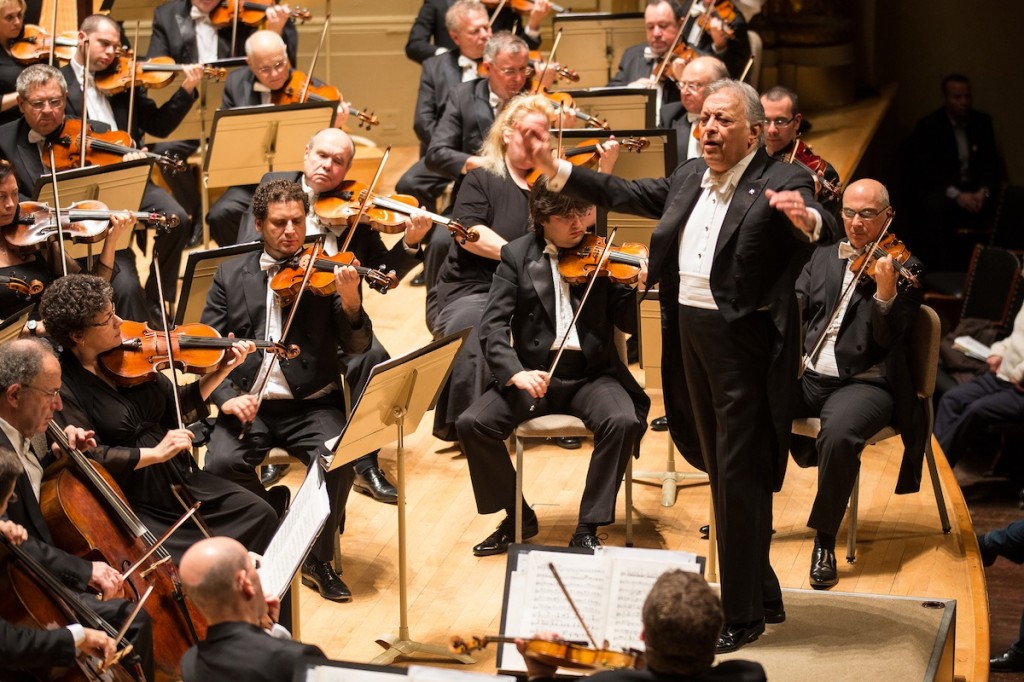Mehta, Israel Philharmonic serve Bruckner’s Eighth straight up

Zubin Mehta conducted the Israel Philharmonic Orchestra Wednesday night at Symphony Hall. Photo: Robert Torres
The Israel Philharmonic Orchestra and its maestro-since-forever Zubin Mehta painted Anton Bruckner’s Eighth Symphony in bold primary colors Wednesday night in Symphony Hall.
In the performance, presented by Celebrity Series of Boston, one could almost hear the Austrian organist-turned-composer pulling the knobs in his organ loft as section after section of the orchestra kicked in, lifting the music in long crescendos. At other times, it seemed as though the organist had hit a piston, and a whole region of the instrument flared to life at once.
Especially in the first movement, tapering of entrances was minimized, as instruments (especially woodwinds) seemed to click on and off like organ pipes. In fact, on Wednesday night the opening bars switched on at well above the marked pianissimo.
Mezzo forte remained the default dynamic, and a rock-steady Allegro moderato (emphasis on the moderato) the prevailing tempo, as Mehta and his players focused on elucidating Bruckner’s imposing rhetoric. Sensuous surfaces and coloristic effects took a back seat, when present at all.
The orchestra’s strings, with a sharp-edged tone that rose to a screech in fortissimo, more than held their own against the massed horns and Wagner tubas, whose attacks and intonation sometimes faltered in the early going.
Before condemning a style of playing that would be quite inappropriate for Brahms or Richard Strauss, one must remember that in his symphonies Bruckner was on an entirely different errand than those two were. Still, one felt that Mehta’s approach to the first movement didn’t have to be quite this clinical to achieve the effect of steadiness and lucidity he was apparently after.
However, the galumphing three-to-a-bar of the Scherzo had the players up and dancing and shaping phrases almost in spite of themselves. The frequent repetitions of phrases had the regularity (monotony, even) of a merry-go-round, musical metaphors for the circles we go around in every day.
Presented with an opportunity to create a tender, graceful contrast in the trio, Mehta opted instead for a more austere, plodding-ahead approach. The Scherzo’s return hit new heights of energy and cohesion in the ensemble.
Mehta expertly managed the symphony’s vast slow movement, with its many long crescendos to splendid climaxes. Understated in gesture but clear in intention, the conductor was visibly in control of every bar of music. When one has conducted the same orchestra for 53 years, maybe a raised eyebrow is all that’s required to get everybody on the same page.
The winds still had that blatant, on-or-off quality, and string vibrato was so pronounced that it sounded like bowed tremolo at times, but the closing horn chorale was glowing and in tune, a major advance from earlier for that section.
With its engine seemingly more tuned up than at the outset, the orchestra reached for more expressivity in the symphony’s discursive Finale, beginning with a big, effective opening for stentorian brass and snapping, rhythmic strings. Those same strings managed to soften quite nicely into lyrical passages in a soft dynamic—another advance.
Mehta and the players expertly managed both the subtle transitions and the sudden bursts of sound as Bruckner’s symphonic argument carried them, slowly but inexorably, to the great, prolonged roar of C major at the end. One had the sensation, over the performance’s 80-minute span, of progressing from the defensible to the admirable to the unforgettable.
The Celebrity Series of Boston presents the Takács Quartet in New England Conservatory’s Jordan Hall, 8 p.m. Thursday. celebrityseries.org; 617-482-6661.
Posted in Performances